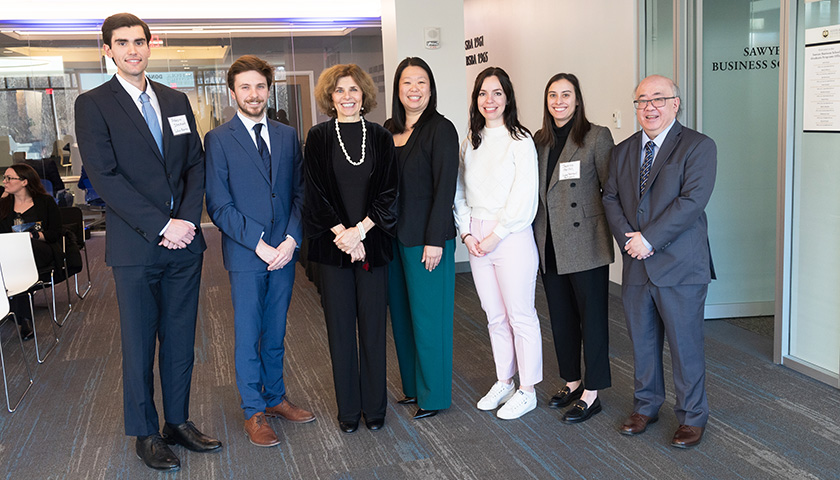Former ACLU Leader Visits Law School
“We are never going to have freedom for the speech we love unless we also are willing to defend freedom for the speech we loathe in this hyper-partisan, hyper-polarized era that we find ourselves in,” Professor Nadine Strossen said during her keynote address (video) at Suffolk University Law School’s 133rd Donahue Lecture in February. Strossen, Professor Emerita at New York Law School, served as head of the ACLU from 1991 to 2008 and is a senior fellow with the Foundation for Individual Rights and Education (FIRE).

In a nation facing polarization and the social media spread of conspiracy theories, there’s much debate about whether free speech rights afforded by the Constitution require updating for the digital age. Strossen argues that future leaders in the law must hold firm in upholding the value of free speech in the existing constitutional framework.
She argued that free speech has been under attack throughout her life, from both sides of the political spectrum. On the left, in the ‘70s, when the ACLU defended Nazi’s right to speak in Skokie, Illinois, a town with a predominately Jewish population, “even the ACLU members themselves were saying that they didn't want to defend the organization—to defend free speech for fascists,” she said.
In the late seventies “we had so-called radical feminists who were advocating suppression of pornography, which they defined as sexual expression that is demeaning or degrading to women,” she said. In the beginning of the eighties, a movement for campus hate speech codes, then, Tipper Gore and others “opposing violent lyrics and misogynistic lyrics and rap music.” And during that same time period, on the right, “an enormous amount of censorship of LGBTQ-related expression, of feminist-related expression and expression about abortion.”
The dangers facing expansive free speech rights are grave presently because institutions that used to be staunch supporters of free speech—academia, journalism, publishing, and librarianship, for example, are “really abandoning or at least questioning their traditional support for free speech,” she said.
Even civil liberties and human rights organizations are under increasing pressure from within their own ranks, she added. The younger members of these institutions do not have the same traditional support for free speech, she said, and that has pushed her to continue her activism.
“Baby boomers, we oldies, have not done enough. We have not been persuasive enough to those who are coming after us that they really have a stake in maintaining strong free speech values,” she said.
Professor David Yamada, who moderated the event along with several students, first met Strossen in 1984 when he worked under her direction in New York University School of Law’s civil rights clinic.
Clifford Benton, a second-year law student, asked Strossen her views on Florida Gov. Ron DeSantis’ “Don’t Say Gay” law. Strossen said the ACLU and first amendment stalwart FIRE have been fighting against the advance of such laws, which she said, are “a violation of not only the right of the teachers to convey information and ideas, but the right of the students to receive information and ideas.”
Olivia Berlin, also a 2L, explained that the Trump Administration had signed a law that allows officials to go after websites like Backpage.com that facilitate sex trafficking. The bill also suspended protections that shielded internet companies from legal liability for the content on their sites. Strossen said she does not support the law, contending that it hinders free speech rights of sex workers and may actually put those workers in increased danger.
Sara Spencer, a 2L, wondered whether the “free market of ideas” approach, with the truth rising after vigorous debate, is less likely to succeed in the age of social media, where speakers have anonymity and don’t have to confront each other’s ideas in person. Strossen argued that “truth is much more likely to emerge from a multitude of voices and vigorous debate and dissent—similar to the scientific method.”
Because her father was a Holocaust survivor, Strossen said, she regularly is asked if her support of the Nazi Party to speak is difficult for her. But Strossen said it isn’t a difficult decision for her. “To me, what is at stake is not free speech for Nazis. It's freedom of speech for whatever view is considered controversial in a particular place at a particular time.”
“And one of the benefits of having a national overview,” she said, “is that you see every single perspective, pro and con, is under siege somewhere.” A few years before the Skokie case, the ACLU had defended Martin Luther King, Jr’s, free speech rights in Cicero, Illinois, she said. The Nazis were an “incidental beneficiary” of the ACLU’s wide-ranging support.
Referencing the upcoming Murthy v. Missouri case before the Supreme Court, she said the Biden Administration has gone too far in putting pressure on social media companies to take down posts that are “basically critiques of Biden Administration policy.” The Trump Administration did likewise, she said. Supporters of the Biden team’s approach have argued that the posts were disinformation that, among other dangers, put citizen’s health at risk.
Lakshmi Hirpara, a 3L, asked whether the sheer speed with which disinformation spreads through social media may call for a different approach “that censors speech that harms the public.”
Strossen said that a legal definition of disinformation, beyond what’s constitutionally permissible now, would be too vague to be reliable and would have a chilling effect on journalists. “So many journalists and scientists and health personnel are going to be afraid of being punished under an anti-disinformation law that they're going to engage in self-censorship,” she said. “And we know that the scientific method depends on getting all of the evidence and information and sometimes misinformation and hypotheses out there.”
The Donahue Lecture Series is sponsored and run by the Suffolk University Law Review. Past speakers have included Supreme Court Justices Sonia Sotomayor and Stephen Breyer (ret.) and the late Justices Antonin Scalia and Chief Justice William H. Rehnquist.



